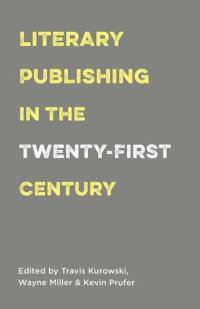
Ebook: Literary Publishing in the Twenty-First Century
Author: Wayne Miller
- Tags: Writing, Language Arts, Literary Criticism, Nonfiction, LAN005000, LAN027000, LCO010000
- Year: 2016
- Publisher: Milkweed Editions
- Language: English
- epub
Gutenberg's invention of movable type in the fifteenth century introduced an era of mass communication that permanently altered the structure of society. While publishing has been buffeted by persistent upheaval and transformation ever since, the current combination of technological developments, market pressures, and changing reading habits has led to an unprecedented paradigm shift in the world of books.
Bringing together a wide range of perspectives—industry veterans and provocateurs, writers, editors, and digital mavericks—this invaluable collection reflects on the current situation of literary publishing, and provides a road map for the shifting geography of its future: How do editors and publishers adapt to this rapidly changing world? How are vibrant public communities in the Digital Age created and engaged? How can an industry traditionally dominated by white men become more diverse and inclusive? Mindful of the stakes of the ongoing transformation, Literary Publishing in the 21st Century goes beyond the usual discussion of 'print vs. digital' to uncover the complex, contradictory, and increasingly vibrant personalities that will define the future of the book.
|Gutenberg's invention of movable type in the fifteenth century introduced an era of mass communication that permanently altered the structure of society. While publishing has been buffeted by persistent upheaval and transformation ever since, the current combination of technological developments, market pressures, and changing reading habits has led to an unprecedented paradigm shift in the world of books.
Bringing together a wide range of perspectives — industry veterans and provocateurs, writers, editors, and digital mavericks — this invaluable collection reflects on the current situation of literary publishing, and provides a road map for the shifting geography of its future: How do editors and publishers adapt to this rapidly changing world? How are vibrant public communities in the Digital Age created and engaged? How can an industry traditionally dominated by white men become more diverse and inclusive? Mindful of the stakes of the ongoing transformation, Literary Publishing in the 21st Century goes beyond the usual discussion of 'print vs. digital' to uncover the complex, contradictory, and increasingly vibrant personalities that will define the future of the book.